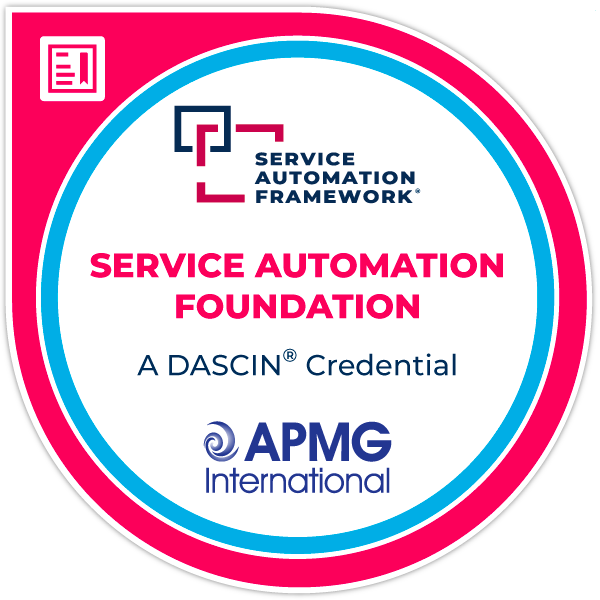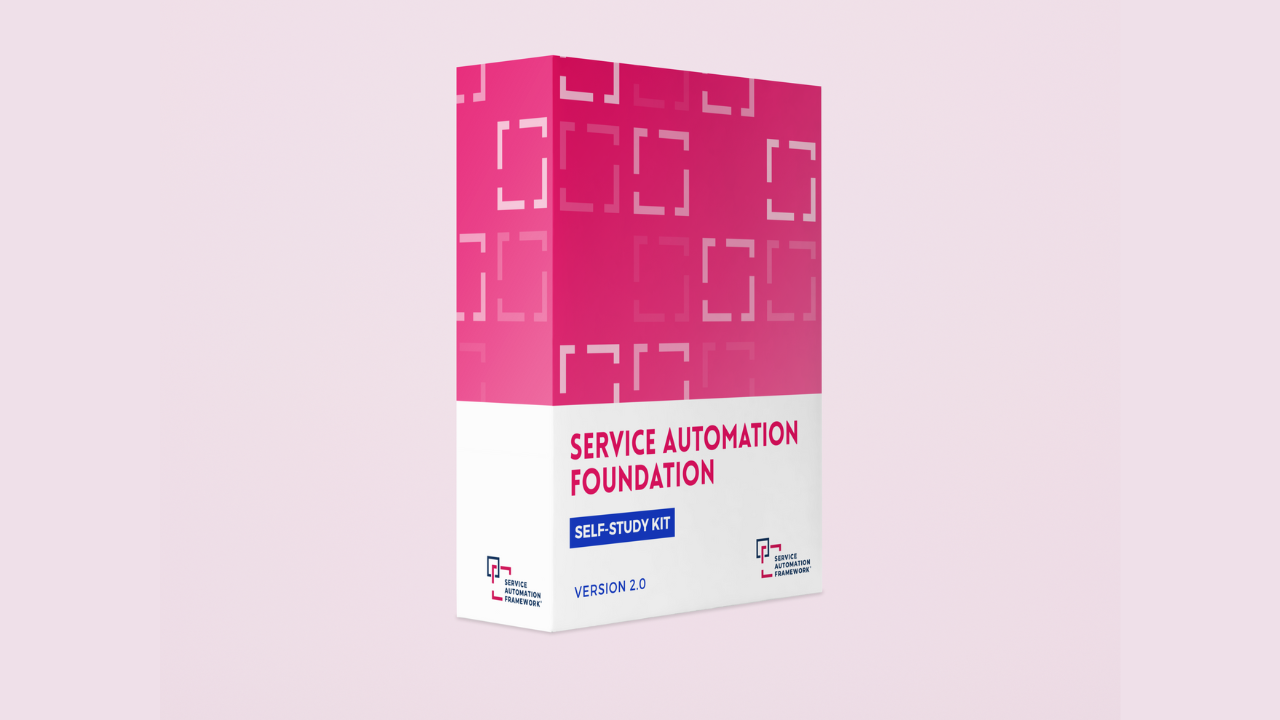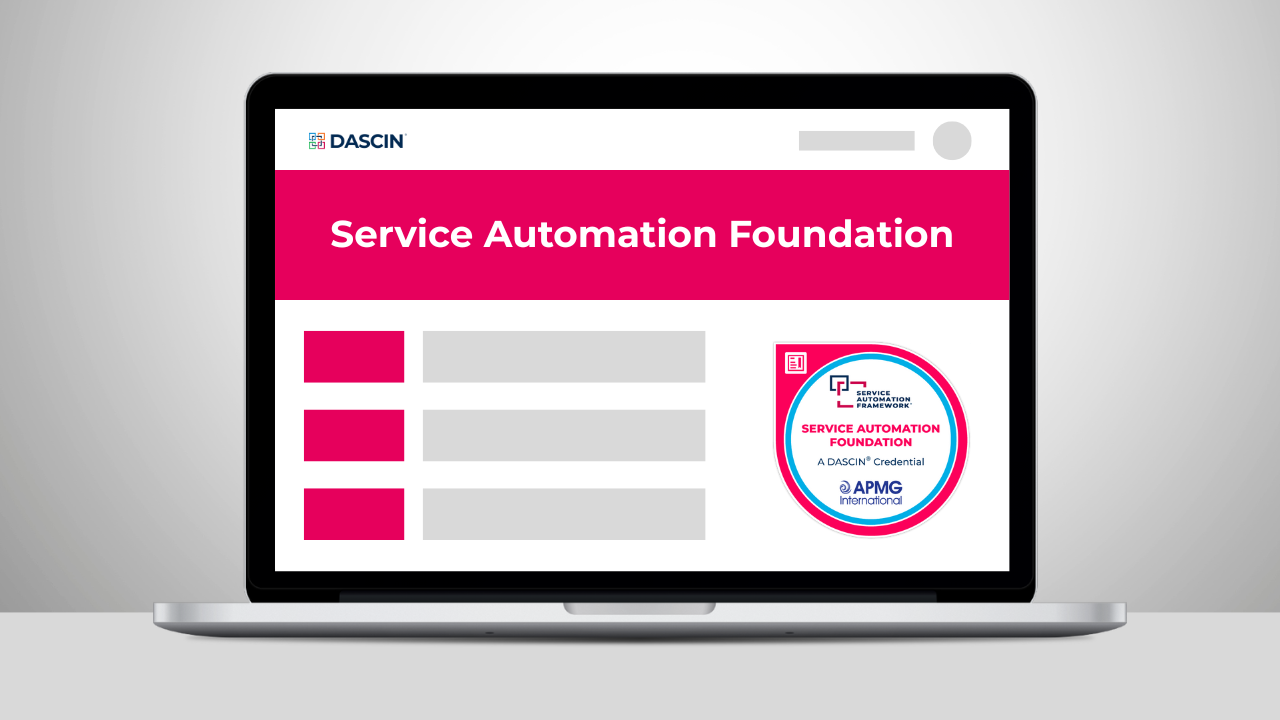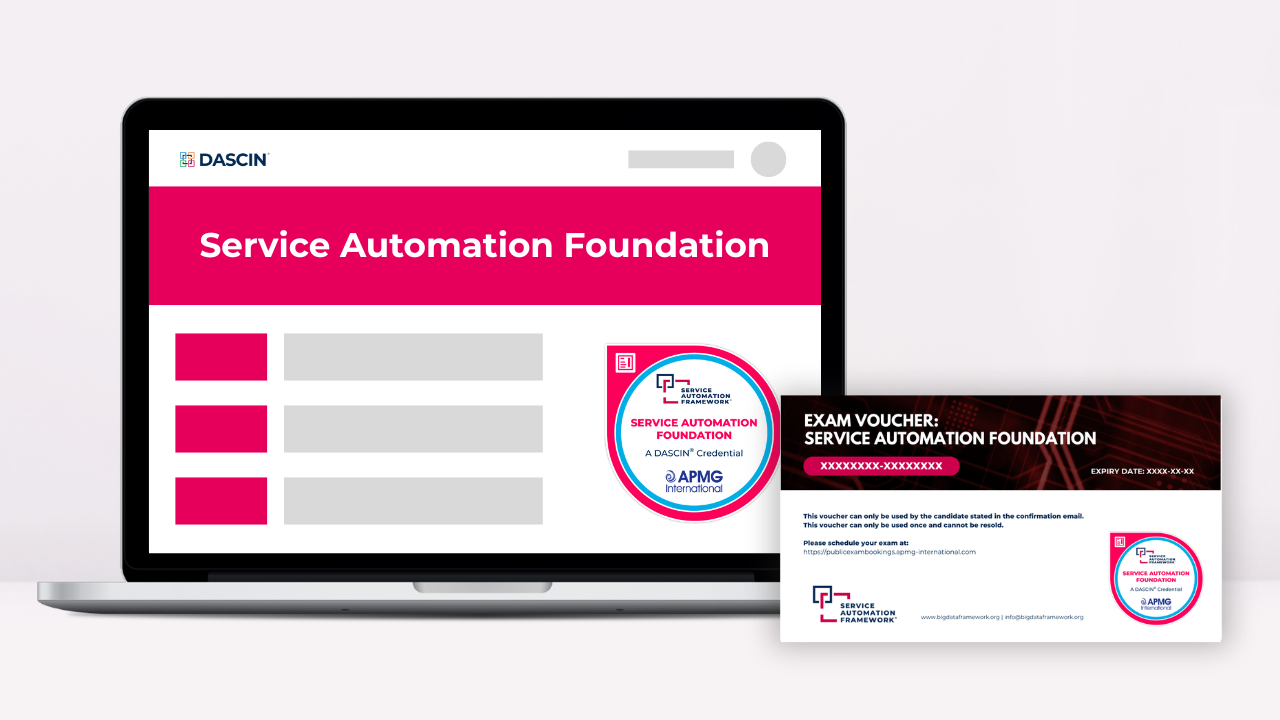Course Summary
The Service Automation Foundation (SAF) course introduces learners to the principles and techniques of the Service Automation Framework, which focuses on the design and delivery of automated services. By leveraging self-service portals, platforms, or applications, service providers can deliver seamless, automated experiences directly to their users. The course highlights the growing importance of service automation in modern businesses and how it drives scalable service delivery models and operational efficiency.
Service automation is at the heart of the success stories of companies like Uber, Netflix, and Booking.com, showcasing its potential to revolutionize industries. Through this course, participants will explore how automated services enable scalable business models, optimize resource usage, and support data-driven decision-making. The Service Automation Framework integrates established best practices in design thinking and service management, offering a practical approach to crafting automated services with a focus on superior user experience.
Participants will gain hands-on knowledge of blueprinting techniques for designing automated services and technology interfaces, as well as understanding the necessary processes to ensure effective delivery. By the end of the course, learners will be well-equipped to apply these techniques and positioned to pass the Service Automation Foundation certification exam, marking a significant step in their journey toward mastering service automation.
detailed course Information
The learning objectives of the Service Automation Foundation course include:
- Understanding Service Automation: Gain an understanding of the history of service automation, its core benefits, and the business drivers that make service automation a critical component of modern service delivery models.
- Scalable Service Delivery Models: Learn how service automation enables scalable, cost-effective service delivery and its inter-relationship with popular service management and design thinking approaches to create optimal solutions.
- Service Automation Framework: Explore the structure and components of the Service Automation Framework, providing a comprehensive model and practical techniques to design and deliver automated services effectively.
- Blueprinting Automated Services: Master the Service Automation Blueprinting technique to design automated services and processes, ensuring seamless integration and superior user experiences.
- Self-Service Portals: Understand self-service portal design and approaches for enabling users to easily consume automated services, fostering accessibility and efficiency.
- Measuring User Experience (UX): Learn techniques for measuring user experience in automated services to ensure satisfaction and alignment with user needs.
- Automated Processes and Workflows: Gain practical knowledge of automated processes for deployment, service delivery automation, and customer retention, as well as workflow design for the efficient delivery of automated services.
- Continual Improvement Practices: Develop skills to continually improve service automation practices, ensuring the delivery model remains relevant, scalable, and aligned with evolving business needs.
These learning objectives equip participants with the foundational knowledge and practical skills to design, deliver, and optimize automated services. The Service Automation Foundation course prepares learners to apply these techniques in real-world scenarios and to achieve certification, driving operational excellence through automation.
The Service Automation Foundation course is a structured and interactive program designed to equip participants with a comprehensive understanding of the Service Automation Framework and practical techniques to design and deliver automated services. The course is divided into distinct modules, each focusing on a key aspect of service automation, delivered through engaging sessions with real-world applications.
Module 1: Introduction to Service Automation
- Overview of the history and evolution of service automation
- Understanding the core benefits of service automation, including scalability and operational efficiency
- Examining the business drivers that make service automation essential for modern organizations
Module 2: Service Automation Framework
- Detailed exploration of the structure and components of the Service Automation Framework
- How the framework integrates with service management and design thinking approaches
- Practical applications of the framework in designing automated services
Module 3: Designing Automated Services with Blueprinting
- Introduction to the Service Automation Blueprinting technique
- Techniques for designing automated services and processes
- Aligning blueprint designs with user needs and organizational goals
Module 4: Self-Service Portal Design
- Principles of self-service portal design and usability
- Best practices for enabling users to efficiently consume automated services
- Case studies of successful self-service implementations
Module 5: Measuring and Enhancing User Experience (UX)
- Techniques for measuring user experience in automated services
- Understanding the impact of UX on service adoption and satisfaction
- Strategies for continuously improving the user experience
Module 6: Practical Automation Processes
- Implementing automated processes for deployment, service delivery, and customer retention
- Workflow design principles for the effective delivery of automated services
- Leveraging automation to achieve cost-efficiency and scalability
Module 7: Organizational Impact of Automation
- Assessing the impact of service automation on people and organizational culture
- Strategies for managing change and fostering a culture of automation
- Understanding the role of leadership in driving automation initiatives
Module 8: Continual Improvement in Service Automation
- Techniques for monitoring and improving service automation practices
- Leveraging data-driven insights to refine automation strategies
- Creating a roadmap for sustainable service automation enhancements
This course provides participants with the knowledge and skills needed to design, implement, and optimize automated services within their organizations. By the end of the program, learners will have a strong foundation in service automation principles and be prepared to successfully complete the Service Automation Foundation certification exam.
The target audience for the Service Automation Foundation course includes:
- Service Managers and Service Designers: Professionals responsible for overseeing and designing service delivery processes who want to enhance their understanding of automation techniques and frameworks for optimizing service delivery.
- IT Professionals and Technicians: IT staff involved in the implementation and management of automated systems and processes within their organizations, looking to gain a structured understanding of service automation.
- Business Analysts: Individuals working on process improvement initiatives, seeking knowledge on how automation can enhance business efficiency and streamline service delivery models.
- Operations and Process Managers: Professionals who manage day-to-day operations and service delivery, aiming to integrate automation for cost-effective and scalable service management solutions.
- Project Managers: Those responsible for leading projects that involve service automation and want to understand the framework, blueprinting techniques, and best practices to successfully implement automation within projects.
- Automation Specialists and Engineers: Those in roles that focus on the technical implementation of automated systems and workflows who need to learn how to apply service automation principles and design techniques effectively.
- Aspiring Service Automation Professionals: Individuals looking to develop or transition into a career in service automation, aiming to gain the foundational knowledge and certification needed to work in this growing field.
This course is ideal for anyone looking to gain a solid understanding of service automation principles, framework, and best practices to design and deliver automated services, ensuring operational efficiency, scalability, and enhanced user experiences.
The Service Automation Foundation course concludes with an official APMG Examination, designed to assess the participant’s understanding of the core principles and techniques of service automation. This structured evaluation ensures that learners have acquired the foundational knowledge needed to design and deliver automated services confidently. Below are the key details about the examination:
- Material Allowed: This is a closed book exam. Study materials, including the course guide, are not permitted during the examination.
- Exam Duration: The exam is 60 minutes long. Candidates taking the exam in a language other than their native or working language receive an extra 25% of time, extending the duration to 75 minutes.
- Marks and Scoring: The exam consists of 40 multiple-choice questions, each worth 1 mark. There is no negative marking, and unanswered questions will receive no marks. To pass, participants must score 26 marks (65%) or more. An elevated pass mark of 30 marks (75%) is required for individuals aspiring to become trainers.
- Complexity: The exam includes questions at Bloom’s Levels 1, 2, and 3. Bloom’s Level 1 focuses on recalling basic facts and concepts, such as defining service automation principles or identifying key components of the framework. Bloom’s Level 2 tests the understanding of concepts, such as explaining how automation enhances service delivery models. Bloom’s Level 3 involves applying knowledge in practical contexts, such as determining the best blueprinting technique for a specific automated service design.
This examination is designed to confirm that participants have achieved a solid foundation in Service Automation, enabling them to apply their knowledge effectively in real-world service automation projects and initiatives.
Digital Badge

Testimonials & Course Reviews
The Service Automation Foundation course completely transformed my approach to service delivery. I now see how automation can simplify our operations and help us scale more efficiently. The section on automated processes was a game-changer, and I’ve already started applying the blueprinting techniques to improve workflows in my department.
This course was incredibly insightful. It gave me a clear understanding of how automation can drive efficiencies in service management. The emphasis on user experience and how it integrates with automation was especially relevant to my work, where we’re constantly looking to enhance our customer-facing services.
I didn’t expect to learn so much from this course! The practical examples of how automation can improve service delivery were really helpful. I’ve already started applying some of the principles to automate processes at BP. The course helped me better understand how automation connects to broader organizational goals.
What I loved most about the course was how it balanced theory with practical techniques. The blueprinting techniques and self-service portal design were extremely useful, and I now feel confident in my ability to design automated services that deliver real value. The course content was spot on for what we’re trying to achieve.
The Service Automation Foundation course helped me see the bigger picture of automation beyond just technology. It made me realize the organizational impact, especially on people and processes. I can already see how I’ll be able to use these insights to drive meaningful change in my role.
I found this course to be a real eye-opener. The deep dive into service automation frameworks and practical tools for process design will make a huge difference in how we approach automation projects. I’m already applying the concepts to our current projects
This course gave me the perfect foundation for implementing service automation at MetLife. The lessons on measuring user experience were a great takeaway, and I’m excited to bring those insights into our customer-facing systems. It’s clear that automation will not only improve efficiency but also the overall customer experience
I’ve been looking for ways to streamline our ITSM service delivery processes, and this course was exactly what I needed. The material was clear, and the practical tips on workflow design and service automation were directly applicable to my role. I’m looking forward to using these tools to improve our service operations.






